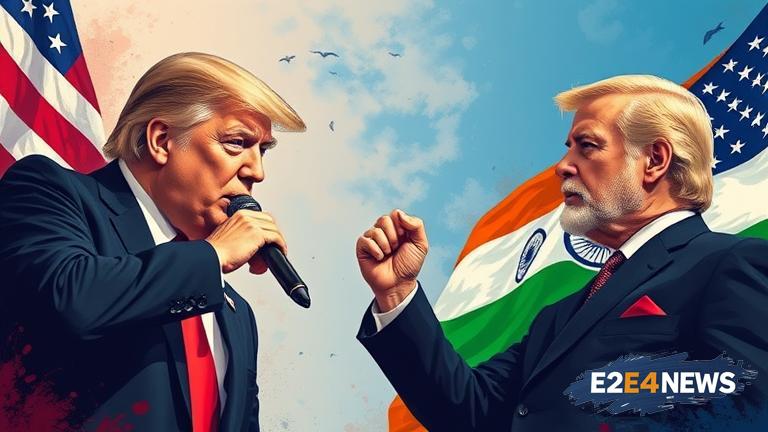The United States has announced plans to impose 25% tariffs on Indian goods, a move that is expected to escalate trade tensions between the two nations. The tariffs, which are set to be implemented in the coming weeks, will affect a wide range of Indian products, including textiles, pharmaceuticals, and agricultural goods. The move is seen as a response to India’s recent trade policies, which the US has deemed unfair. The US has long been a major trading partner for India, and the imposition of tariffs is likely to have significant economic implications for the country. India has already expressed its disappointment and concern over the move, with officials stating that they will take all necessary steps to protect the country’s interests. The tariffs are also expected to have an impact on US businesses that rely on Indian imports, with many companies likely to face increased costs and reduced profitability. The US has been critical of India’s trade policies, including its high tariffs on US goods and its restrictions on foreign investment. The US has also been pushing India to open up its markets to US companies, particularly in the areas of agriculture and pharmaceuticals. India, on the other hand, has been seeking to protect its domestic industries and has imposed its own tariffs on US goods. The trade tensions between the US and India have been escalating for some time, with both countries imposing tariffs on each other’s goods. The situation has been further complicated by the COVID-19 pandemic, which has disrupted global trade and led to a decline in economic activity. The imposition of tariffs by the US is likely to exacerbate the situation, leading to increased costs and reduced trade between the two countries. India has already taken steps to diversify its trade relationships, including signing trade agreements with other countries such as the UAE and Australia. The country is also seeking to increase its trade with other nations, including those in Southeast Asia and Africa. Despite the challenges, India remains a significant player in the global economy, with a large and growing market. The country is also home to a number of major industries, including textiles, pharmaceuticals, and technology. The US, on the other hand, is one of the world’s largest economies, with a significant trade deficit with India. The trade tensions between the two countries are likely to have significant implications for the global economy, particularly if they lead to a decline in trade and investment. The situation is being closely watched by other countries, including China, which has its own trade tensions with the US. The European Union has also expressed its concern over the situation, calling for a resolution to the trade tensions. In terms of the impact on the US economy, the tariffs are likely to lead to increased costs for consumers, particularly in the areas of textiles and pharmaceuticals. The tariffs may also lead to job losses in industries that rely on Indian imports. On the other hand, the tariffs may also lead to increased demand for US-made products, particularly in the areas of agriculture and manufacturing. The situation is complex and multifaceted, with both countries having valid concerns and interests. A resolution to the trade tensions will require careful negotiation and diplomacy, with both countries seeking to protect their interests while also promoting free and fair trade. The US and India have a long history of trade and economic cooperation, and it is likely that the two countries will seek to find a resolution to the current tensions. However, the situation remains uncertain, and the implications of the tariffs are likely to be felt for some time to come. The Indian government has already announced plans to impose retaliatory tariffs on US goods, which is likely to further escalate the situation. The US has also been critical of India’s intellectual property laws, which it sees as inadequate. The trade tensions between the US and India are not limited to tariffs, but also include issues such as market access and investment. The situation is being closely watched by businesses and investors, who are seeking clarity and stability in the trade relationship between the two countries. The US and India have a significant trade relationship, with bilateral trade totaling over $140 billion in 2020. The trade relationship is also an important component of the strategic partnership between the two countries, which includes cooperation on issues such as defense and security.
